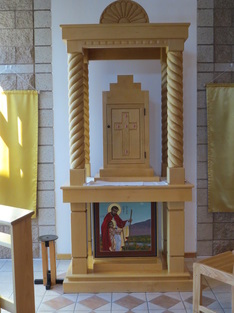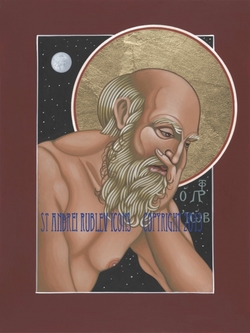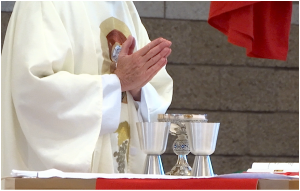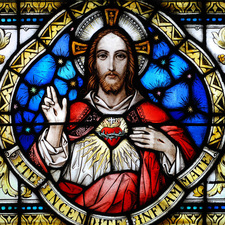 There is little doubt in my mind as to why the Feast of Corpus Christi and the Feast of the Sacred Heart of Jesus are within the same week in the liturgical calendar. It truly makes sense that when we are celebrating the incredible mystery of the Eucharist which Jesus left us, that it is His body, blood, soul, and divinity, we also remember it comes forth from a heart completely imbued with love. His heart literally ached and broke for love of us, and through that heart flows His precious blood. The Sunday feast, Corpus Christi, is about the absolute mystery of the bread and wine becoming the body and blood of Jesus; this means it is a mystery which can never be understood in this life. But the Feast of the Sacred Heart, though still a mystery, is about the depth of the love of God for His people. In other words, the first feast is about the reality of the Eucharist, the other is about the love behind the reality. The Eucharist is what fuels our experience of God’s love. Therefore, there is an intimate connection between these two feasts. When I reflected on this it reminded me that I have sometimes heard people talk about a difficult experience as a test from God. They say: “This is so difficult. I think God is testing me.” I have to admit that I do not believe God tests us. He does allow things to happen which may be difficult since that is part of living as a human in a world in which all people have free will. Even the cosmos has a type of freedom; that is, there are laws in nature, but there is also randomness in how some things occur. It is beyond us to really know the ‘why’ of many things.  God knows our hearts and minds better than we know ourselves and therefore He knows everything about how we make choices, what our strengths and weaknesses may be, and what we tend toward. A loving God has no need to toy with us just to see how we might react. Some would argue against this assertion using the Book of Job as their ‘proof.’ In Job it says that God allowed Satan to put Job to the test, not once, but twice. However, the Book of Job was written as a short story (or even a long parable) therefore the testing is a scenario in which the author is making a point, inspired by God in his writing. He is trying to explain that suffering often comes unbidden and that it is mysterious. The inspired author set out to dispel some common misconceptions about why people suffer. In the end God (through the writer) wants us to know that we ought not to be asking “Why am I suffering?” because it is a question which is too complex for us to comprehend. Rather we should ask, “Where is God when I am suffering?” This is a question with an answer: God is with us in the midst of our suffering. Therefore the Book of Job is not about being tested. It is about God’s love which is so great that He enters into our every suffering with us, just as Jesus Christ came into the world to enter into our suffering and therefore to redeem us. Another story which is often misunderstood is the story in the book of Genesis about Abraham nearly sacrificing Isaac. While the Bible's editors have actually titled this section “the testing of Abraham," it is not really a story about Abraham, but rather it is about the nature of faith. Abraham had spent all of his very long life doing what God asked of him without even the hint of a question. When God said for him to leave his homeland and go to a place God did not even identify at the time, he went. He believed Him when he was told in his old age that he would have a child by his wife who was well past childbearing age. Abraham never wavered in his belief in any of God’s promises. So why would God have any need to test this man? God simply would not have had any reason to do so.  In the story God tells Abraham to take Isaac, his only son by his wife, to a mountain top and to sacrifice him there. God had previously made a covenant with him promising a nation would come from Isaac’s descendants. Abraham knew that God had never broken any covenantal promise. But nonetheless, he must have been in turmoil as he went up that mountain because the command did not make sense. But he did proceed. Abraham trusted God so deeply, that even in his utter confusion as to why God would ask this, he went as far as raising the blade over his son who was on the altar of sacrifice. God, of course, stopped Abraham from committing any harm to his son. But here is the point: this story was not about Abraham being tested, it was about Isaac learning the type of faith he would need to carry on the covenant. He had to see the radical faith in God which Abraham possessed and in which he would have to live as he took over the role of patriarch after Abraham’s death. In short, Isaac needed a lesson in radical faith and God provided it. This incident was to teach Isaac and the rest of us that faith is what we need when situations do not make any sense. It is when situations or circumstances that are difficult try our resolve or when the ‘enemy of our human nature’ (the evil one) tempts us, that we are tested. But God is not a tester. He would not be a loving God if He was whimsical and flighty about how He treated us, or if He tested us as if He did not know our heart. Some may argue that He tests us to strengthen us, but I do not think so. Life tests us enough and God does not have to add to it. Instead I think that when the hardships come, God walks into it with us giving us strength in our weakness. The test does not strengthen us. God does.  It is important to accept that God loves us much better than we know how to love Him or anyone else. His love is so deep that we cannot comprehend it. We can experience it, but we really cannot understand the mystery of how God could continue to love us when we sin or how He loves us so deeply that there is nothing we can do to lose that love. Some of us search long and hard for love that lasts, even the entirety of our lives, when all along we have the love of God which has no beginning or end. The Sacred Heart of Jesus is the heart of God and this heart is infinite with depths which cannot be plumbed. The heart of Jesus loved us so much that He came into the world, suffered, died, and rose for us. But before He did this, He left Himself here with us in the form of simple bread and wine. His love is so mysterious and complex that we cannot understand how this is. But we can see, touch, taste, and smell the bread and wine become Body and Blood. When it is consecrated it is really and truly the entire body, blood, soul and divinity of Jesus Christ. It is not a symbol nor is it a reminder. It is Jesus. Therefore, when we celebrate the Feast of Corpus Christi we are celebrating the great mystery of Jesus giving us His body and blood as an everlasting gift until the day comes when we are united with Him face to face in Heaven. We are never alone because He is with us in spirit and in flesh. And when we celebrate the Feast of the Sacred Heart of Jesus we can know that the human and divine heart of Jesus contains the very love of God. It enables us to receive the Eucharist and in turn to bring Eucharist to others through our own loving acts. The gift of access to the Heart of Jesus, the love of God poured out for us in an everlasting covenant of love through bread and wine which becomes His body and blood, is incalculable. It is not something we earn. It is simply Jesus being Jesus. The Heart of Jesus is never empty and His love never runs dry. Therefore let us live in thanksgiving for so great a gift as the love of God poured out endlessly for us. Let us find strength in His heart and in the food for the journey with which He has provided us.  May we always appreciate the great gift of the love of God for us poured out in the Body and Blood of Jesus! May we find solace for our grief as well as joy in our blessings within the Sacred Heart of Jesus! May we continually be fed by the Body and Blood of Jesus contained in the Eucharist! May we lead others to the love of God, and may we place our care for them within the Sacred Heart of Jesus! May we find in Jesus the example of how to live lives of faith and love! And may we never lose sight that we are loved and that we are children of God forever! Let us continue to meet in the Sacred Heart of Jesus! Peace! ©Michele L. Catanese The top photo is mine and was taken at St. Joseph on the Rio Grande Catholic Church in Albuquerque, New Mexico. This is the tabernacle with the original icon San Jose en el Rio Grande beneath. The icon is the work of Fr. William Hart McNichols and copies can be obtained as plaques or cards at http://fineartamerica.com/featured/san-jose-en-el-rio-grande-william-hart-mcnichols.html The next icon, which is Holy Prophet Job, is also the work of Fr. William Hart McNichols and it can be found at http://www.fatherbill.org/all-categories/product/320-holy-prophet-job Following this are two more photos: the first I took on a hiking trail atop Sandia Peak in Albuquerque, New Mexico and the second is of the hands of Fr. Bill McNichols as he is celebrating the Eucharist. Finally is The Sacred Heart of Jesus, a stained glass work by Philip Ralley. It can be found at http://fineartamerica.com/featured/1-sacred-heart-of-jesus-in-stained-glass-philip-ralley.html
Carmella Wygant
6/9/2015 03:08:11 am
I woke up early and while still lying in bed I read your beautiful words. The content is so rich I cannot think of a better way to start the day. I thank God for the gifts you were given and share Michelle. Reminding me God's love for us in incalculble and his very presence for each of us in eucharist...I really don't have words just gratitiude for the relentless favor. Love and Respect, Carmella Comments are closed.
|
Heart Speaks to Heart
|

 RSS Feed
RSS Feed

